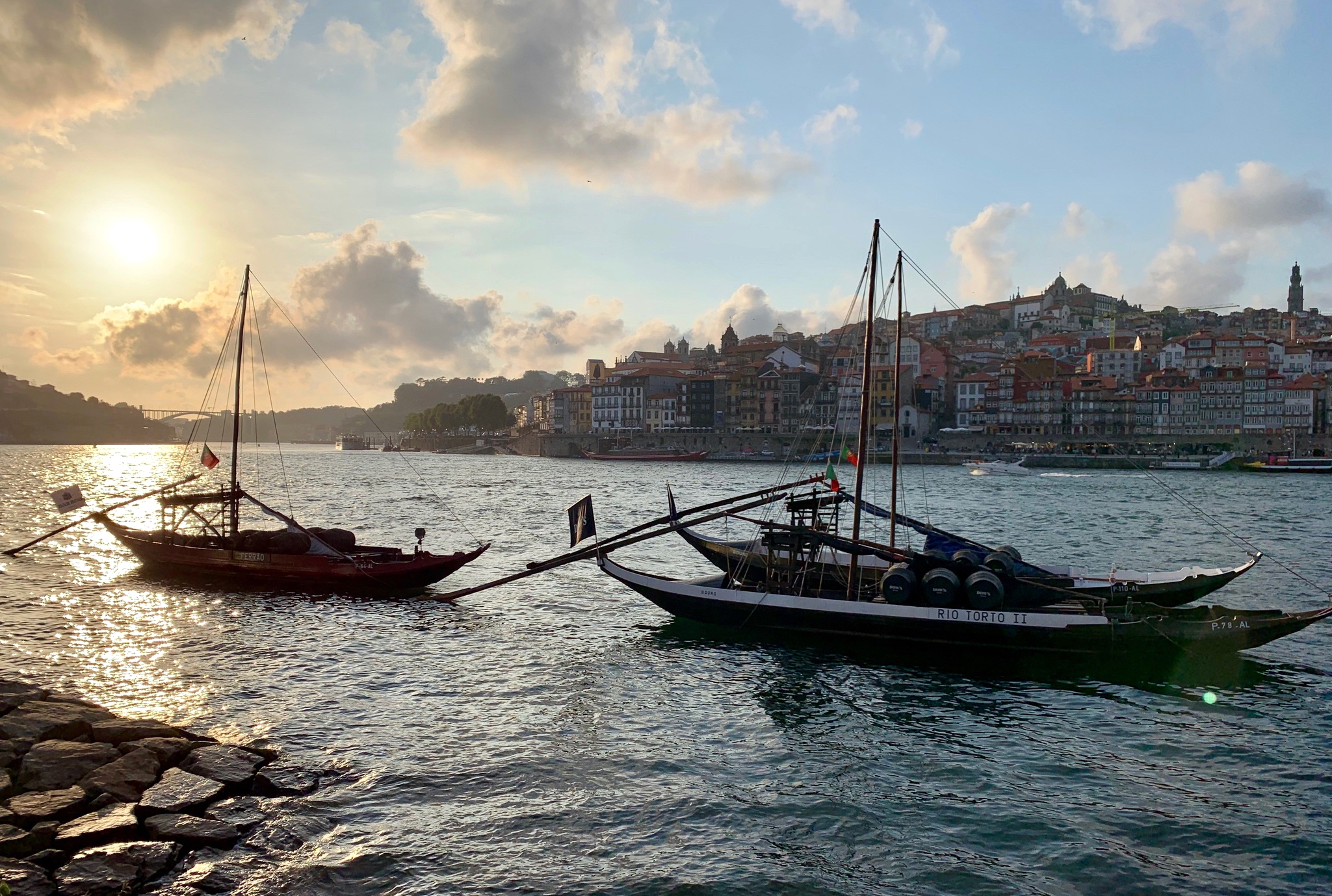Another Bride in Porto by Jennifer Sears

“When I desire you a part of me is gone…” Anne Carson, Eros the Bittersweet
In Porto, everything shimmers with white. Churches with white towers line the city’s white hills. Women wearing flowing white pants and white high heels hobble up and down the city’s cobblestone streets. Men wearing white polos and white hats crowd the bars that line the Cais de Riberia where waiters in white aprons carry trays of white wine, which in Porto everyone calls green.
“Obrigada,” she and her husband say when waiters bring their white wine.
“Obrigada,” they say when people congratulate them on their first week of marriage.
“Obrigada,” she says when people compliment the ring that looks so new on her finger, she wonders if, like the white wine, she too isn’t green.
For their honeymoon, she packed only high heels, impossibly wrong for Porto’s steep streets. She explains her predicament to a woman in a shoe store who brings her white sandals with thick soles, white ballet flats, and white tennis shoes.
“A new bride must wear white,” the saleswoman insists. “A bride must remain a bride for as long as she can.”
She counts out her Euros. Could the woman not see? Though she’s never been married before, she is not a bride of twenty or thirty and let’s-not-even-talk-about-forty. Old enough, let’s say, to make people ask if she would wear white when she walked down the aisle.
When she steps back onto Rua de Santa Caterina, she realizes that trip to the shoe store has been her first outing alone since the wedding ceremony one week before. Diamond ringed, high-heeled––as she walks back to her husband waiting in their hotel room, even her aloneness feels new in the city so filled with churches, so mockingly bride-white.
When they take a train outside of Porto, white flowers in trees flash past their windows. White clouds hover against the humid June sky. At the remote site of ancient Conimbríga, four white columns mark a Roman forum. White limestone shards fire up the eyes of minotaurs trapped in mosaics on the old triclinium floors. She obsessively takes pictures of the eerie abandoned site but accidentally erases them all before they leave.
She feels a new fear. Will she lose herself in him?
In Coimbra––another pale city clinging to another of Portugal’s hills––a white cobblestoned street winds past a fado café. They stop to eat sausages served over live flames. The salty meat reminds her of tears as they listen to the music she came to Portugal to hear. Mournful lyrics. Weeping guitars. Fatum. Saudade.
She doesn’t give a fuck if fado is touristy because isn’t love also touristy when it’s still new?
“What changes, now that we’re married?” she asks him as they eat.
“Nothing,” he says. “Except we know we’ll be together next year. And the next.”
“And we’ll always be happy?”
“We’ll decide to be happy.”
Finished, they continue the steep climb toward a cryptoporticus (a word to turn on the tongue), once a base for another Roman forum. They walk through the underground corridors and arches, the skeletal remains of Augustus’ city of Aeminium. Fatum.
On a day tour into the Duoro Valley, they rush from one white-walled winery to the next. He tells the pretty young tour guide they are on their honeymoon.
“Another bride in Porto!” the guide shouts. At the next vineyard, the guide makes everyone toast them with white wine.
But when her husband disappears to photograph the mountainside terraced with grapevines and olives, the tour guide tells her how she and her husband––both employed in Porto’s honeymoon industry––had no money or time to enjoy their own honeymoon. Yet, the guide insists on toasting them at every stop.
Saude to our honeymoon couple! she shouts as the tour bus crests the next hill.
Saude! she cries again at the restaurant on a mountain cliff where they eat grilled sardines.
After they board a rabelo on the Duoro River, she makes the whole group toast them again “Saude! Another bride in Porto!”
Their first argument as husband and wife is about the Italian journalist who exposed the identity of the writer most likely to be Elena Ferrante. Is it an ethical violation to take away a writer’s anonymity? Is the journalist doing his job, turning up a possible answer to a mystery longing to be solved? Or, should a writer, a writer with a woman’s name, be allowed to decide to keep her identity hidden?
She argues her point to tears, too much white wine, perhaps. But wasn’t this also perfect—their argument about a woman’s choice of identity, this question of names after she, ten days before, chose to take his?
She steps onto the balcony. On the street below, a woman walks alone, navigating the cobblestones with her heels. Her white dress glows in moonlight. Despite rings, despite names, despite marriage, wasn’t that woman walking alone in the dark still her?
On their last evening in Porto, they enter a fado café near the Palacio da Bolsa, away from the busy Cais de Riberia and find themselves in an earlier century. Art Deco iron grillwork and red velvet wallpaper. Cavernous white ceilings. Dusty chandeliers drip with glass tears. Giant hams dangle above a white marble bar. Old waiters wearing white jackets carry drinks on white trays. Whisky for him. White wine for her.
As two musicians play Coimbra-style guitars, the first fado singer works the room. They admire how he tries, but his voice is too unbroken, too hopeful, too young. The second fadista is exquisitely old, her face as pale as the city that surrounds them. She wears a black dress and a black shawl, and dark makeup that stains the circles under her eyes.
“Isn’t black the right color for love that lasts?” she says as they watch.
“Maybe,” he says.
Two older women take the table next to theirs. “Just flew in from England,” they inform the old waiter. They order tonic and vodka.
“We quit drinking wine hours ago,” one woman announces, coldly eyeing her Vinho Verde.
Her new husband laughs. He tells the women they are on their honeymoon.
No congratulations. No saude! “Surely not your first,” they say to him.
“Her first,” her husband says, identifying himself as a “repeat offender.”
The women laugh. Waving large diamond rings grafted onto their veiny fingers, they tell him they come to Porto each year to escape their husbands.
By the time the last fadista enters wearing his sweeping, black cape, the old women have quit the tonic, ordering their vodka straight up.
This fadista plays an enormous accordion to accompany his enormous voice and begins a fado she recognizes: “De ilusões desvanecidas…Fumo de esperanças perdidas. ..Minha canção é saudade.”
“Bravo!” the women clap. This, too, is what they came to hear.
And, in the window, the reflection of all in the room that is white shimmers over the dark square.
“Are you all right?” her husband asks.
“I’m happy,” she says. “I feel fine.”
 Jennifer Sears’ stories and essays appear in Witness, Kenyon Review Online, Electric Literature’s Recommended Reading series, Fence, Guernica, Fiction International, North American Review, Nabokov Studies Journal and elsewhere, and have been cited in Best American Essays, Best American Non-required Reading, and Best American Short Stories. She has received writing fellowships from the National Endowment for the Arts, the New York Foundation for the Arts, and the National Endowment for the Humanities. She teaches English at City Tech/City University of New York. Her current centering space is the Temple of Vesta at the Roman Forum.
Jennifer Sears’ stories and essays appear in Witness, Kenyon Review Online, Electric Literature’s Recommended Reading series, Fence, Guernica, Fiction International, North American Review, Nabokov Studies Journal and elsewhere, and have been cited in Best American Essays, Best American Non-required Reading, and Best American Short Stories. She has received writing fellowships from the National Endowment for the Arts, the New York Foundation for the Arts, and the National Endowment for the Humanities. She teaches English at City Tech/City University of New York. Her current centering space is the Temple of Vesta at the Roman Forum.
